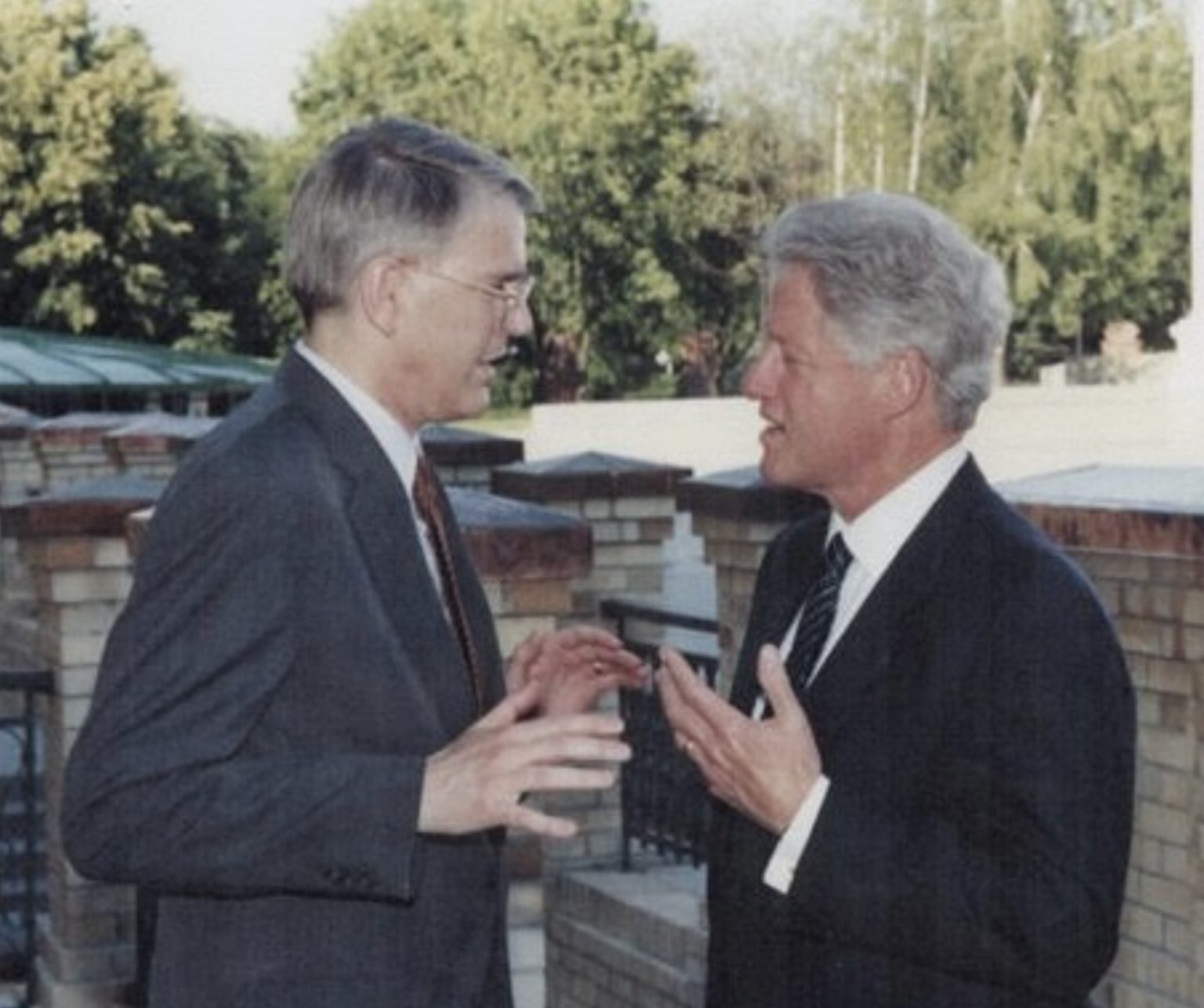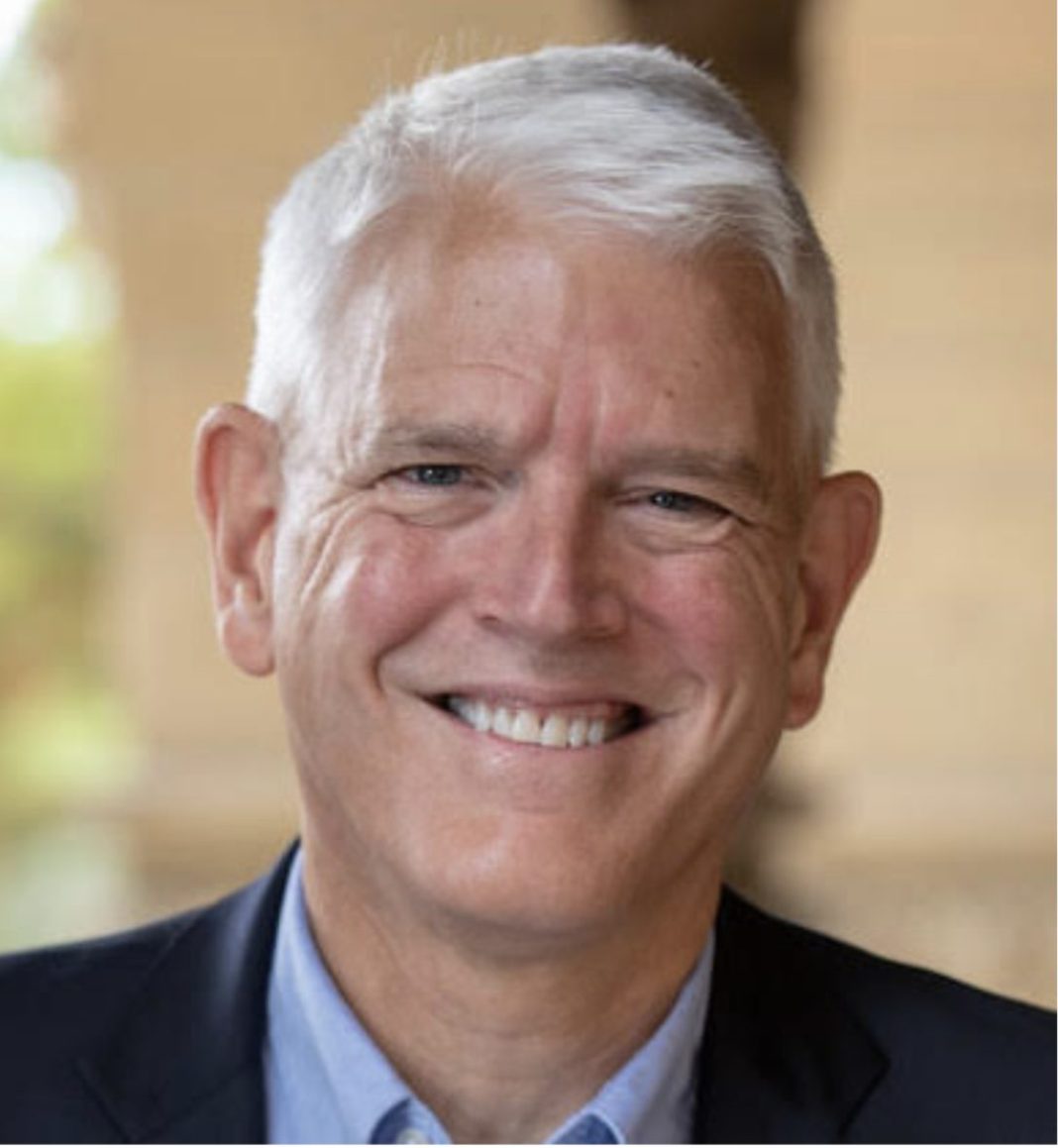Steven Pifer greets me at the door with a limp. He’d broken his kneecap en route to Kyiv three weeks ago, and scrambling for hotel bomb shelters in the wee hours of the morning hadn’t done his injury any favours. “The nice thing about this,” he jokes about his injury, “is I got dispensation to use the elevator.”
Pifer was the American ambassador to Ukraine from 1998 to 2000. His house reflects it. Blue-and-yellow flags, Oval Office photos with Bill Clinton, and a ceremonial mace from Kyiv decorate his home in Morgan Hill, California, where he settled down after twenty-seven years serving in Washington and abroad. Pifer enjoys the change of scenery. “Walk twelve minutes that way,” he says, “and I’m out in vineyards and in orchards. I like it here.” The former ambassador, though, is anything but retired in the larger sense. It’s because of his ongoing involvement in Ukrainian affairs that Morgan Hill Life publisher Marty Cheek and I are here for an interview.
Pifer’s time in the State Department began in 1978. He served his probationary years under Carter, managed the arms control portfolio at the Moscow embassy during the Reagan administration, and was a deputy assistant secretary of state in the Bush Jr. years. It was in the Clinton administration where he found Washington-Moscow diplomacy to be particularly effective: it had the unusual setup of bringing all the people on U.S.-Russia issues into one room. Pifer hasn’t stopped trying to get people together for productive dialogue more than twenty years later. Track IIs (non-governmental conversations between former officials and academics) afford him the chance to continue engaging Russia in discussions in the present day. “I still take part in some Track IIs,” he tells us, “both on arms control and on Russia and Ukraine. For the arms control things we have to go to Istanbul because that’s one of the few places that Russians can get to.” Given the current tension between Washington and Moscow, Pifer reflects, nuclear arms negotiations may not go very far. Though ‘unofficial’, Track IIs may provide a window of opportunity for meaningful engagements while the war continues. “The State Department, they encourage these kind of discussions,” Pifer explains, “particularly because there’s no official Track I conversations going on. Having the Track II conversations at least maybe keeps some ideas going back and forth…When I was managing Track IIs, we would always set up times to go and brief somebody at State, at the NSC, ‘This is what we’re hearing.’ Sometimes we’d actually suggest some ideas. I’m happy to have a couple ideas that found their way into U.S. positions.”

Pifer’s present-day involvement isn’t limited to influencing policy. As he’d related at the door, he was fresh off his latest trip back to Ukraine. Knee propped up on a couch cushion, he talks us through his time there earlier in March. “Kyiv looked pretty normal,” he begins, “with a couple of exceptions. One was you saw more guys in uniform on the streets than I ever remember. In the building we got into, we had a chance to go and get a briefing from military intelligence. The buildings would be protected by sandbags or pill boxes. There were heavier guards there. When you would drive around, you’d see these tank barriers that were there in case they had to pull them in the street. Then there was the air raid. I’d never been in an air raid before. They said it was the worst that Kyiv had been hit with in six or seven weeks. Thirty-one missiles.” He takes a second to set the scene: 3:15 am, officials ushering guests into a shelter under the hotel. “We had one guy with us who was British—he was kind of our facilitator. He basically was plugged in. They would send us reports. He said, ‘OK, the Ukrainians reported that the bombers left such and such air base,’ and so that gives you an approximate time, by the time they get to their launch points, when the missiles come in… He goes, ‘Yeah, the cruise missiles now are all reportedly turned towards Kyiv,’ and then I think we heard about five or six explosions which we assumed were the air defences engaging overhead.” He worries for those who have undergone the violence for two years now. “I remember talking to a former Ukrainian colleague at the embassy—this was early on in the war,” he recalls. “And she said one day she’d had to go to the bomb shelter five times in the night. That’s just got to be really draining.”
This visit was not a one-time event. Early in the interview, Pifer speculates on Zelensky’s reasons for passing up a consensus national government, based on a conversation in Kyiv he had “about three weeks before the major Russian invasion.” I have to stop him there. “You were there three weeks before February 24th?” I ask incredulously. “January 30th to February 2nd,” he replies in stride. He notes that during his trip, most Ukrainians didn’t believe there would be a major Russian attack, and something must have changed shortly after his departure. “A lot of the targets that the Russians originally hit were empty warehouses, things like that, because the Ukrainians had moved out.” The Russians, according to Pifer, were less prepared. “A lot of parts of the Russian military, I think, only learned that they were going in at the last minute. There were reports that the Ukrainians had captured some Russian soldiers who had been in the initial invasion force heading forward to Kyiv, and they said they thought they were in Belarus on an exercise. At 9:00 pm, they were rousted out and told to suit up, before being given weapons and informed the operation would start at 4:00 am. After a few sentences of reflection, he draws his conclusion: “I think they [the Russians] seriously thought they would be welcomed as liberators.”
Over two years into the war, Russia’s “liberation” has stalled thanks to fierce Ukrainian counter offensives in 2022 and a gruelling stalemate thereafter. This wasn’t anticipated—Pifer recalls that at the start of the conflict, Ukrainians forces had opened up one of the Russian trucks they had shot down. “It was full of brand new dress uniforms, which [the Ukrainians] assumed was for the [Russian] victory parade.” Even so, doubt as to Ukraine’s ability to continue the war effort indefinitely is growing. Pifer’s view of the conflict’s end is more hopeful. “At some point I think the number of what the Russians call ‘Cargo 200’ (transport aircraft or trucks bringing back the remains of soldiers who have been killed in action) – does that number become so high that people are going to think this is not worth it?” Russia, Pifer reveals, has taken measures to avoid this end, through high salaries in the Far East and Caucasus to promote recruitment. “If you broke down the war by ethnicity, what you would see is that a lot more non-ethnic Russians are being killed than ethnic Russians in part because they’re signing up for this.” In itself, this is not a new revelation—the Moscow Times reported earlier this year that ethnic Russians are underrepresented in total casualties. Pifer’s on-the-ground observations, though, allow him to bring this disparity to bear on an analysis of the war overall. “When I was in Ukraine,” he shares, “one of the Ukrainians said, ‘If you ever got to a point where, to keep the war going, Putin had to begin drafting people from big cities, especially Moscow and Saint Petersburg, at that point you might begin to see the elite turn against the war.’” The former ambassador takes a moment to run back the clock to the 1980s on this analysis, returning to his days under Reagan at the embassy in Moscow. “In Afghanistan, where with probably only 15,000-20,000 Soviet soldiers [killed in action], you had these mothers’ committees organising and they were a fairly strong pressure point. And Gorbachev ultimately concluded that Afghanistan wasn’t worth it. And they left.”
Pifer has alluded to continuing involvement in the conflict on both sides of the Atlantic throughout the interview, so I press him further. These days, he reveals, he’s part of a group of former U.S. ambassadors to Ukraine who are still active in current affairs. “When I get back to Washington, I try to see people at the State Department, at the National Security Council, and try to push and pull them, trying to push the U.S. government to do a bit more, but that’s entirely on the outside. It’s based, I think, on our calculation, at least my own calculation [on] helping Ukraine prevail. This is very much in the national interest, setting aside my feelings about Ukraine.” There’s a fraction of a pause as he collects his thoughts. “There’s also kind of a personal reason. Back in the 1990s, I was involved in the negotiations with Ukraine where they gave up what was at the time the world’s third largest nuclear arsenal.” Part of the deal, Pifer details, was that Russia committed to respect Ukraine’s sovereignty and not use force against Ukraine. “We told the Ukrainians that if the Russians tried something, we would be supportive.” Pifer caveats his message by clarifying that no official deals were made, but returns quickly to his decades-ago commitment. “We said we would do things,” he states firmly. He believes the United States is now living up to that commitment by providing Ukraine arms and other support. He notes that in the early 1990s, “there was a collective failure. Both we in Washington, but also our Ukrainian counterparts in Kyiv, we didn’t foresee what would happen in 2014 or 2022.” He stops just long enough for me to throw out a quick affirmation as I add to my notes. “But that’s kind of secondary,” he says briskly. “The main reason is there’s an American interest there, and that Europe becomes a much more dangerous place if the Ukrainians lose.”
Pifer has a Zoom meeting with the Council on Foreign Relations to attend, so after a generous hour and a half of questions, he shows us out. We shake hands, exchange numbers, and walk out into the April sun. The door swings shut as the former ambassador limps back to his study to catch the call. Two decades after leaving the foreign service, Steven Pifer hasn’t slowed down in his commitment to the people of Ukraine.


